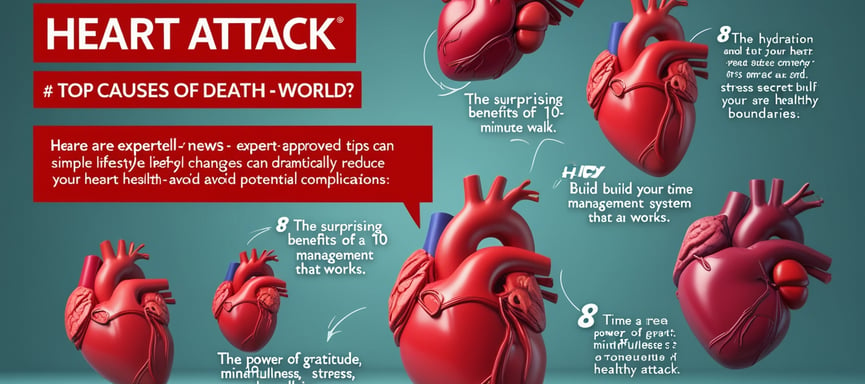
8 Expert Tips for Lowering Your Risk of Heart Attack
Heart attack is one of the top causes of death in the world. The good news? Simple lifestyle changes can dramatically reduce your risk of a heart attack. Here are eight expert-approved tips to improve heart health and avoid potential complications:
HEALTH
11/22/20242 min read


Understanding Heart Attack Risks
A heart attack occurs when the blood flow to the heart is obstructed, often resulting in damage to the heart muscle. The causes of heart attacks can vary, but several underlying factors significantly increase the risk. According to experts, understanding these risks is the first step in prevention. High blood pressure, high cholesterol, smoking, obesity, and a sedentary lifestyle are among the leading contributors.
Tip 1: Maintain a Healthy Diet
A balanced diet plays a crucial role in reducing the risk of heart disease. Experts recommend incorporating a variety of fruits, vegetables, whole grains, lean proteins, and healthy fats into your meals. Specifically, foods rich in omega-3 fatty acids, such as fish and walnuts, can promote heart health. Limiting the intake of processed foods, salt, and sugar can also substantially lower overall risk.
Tip 2: Engage in Regular Exercise
Regular physical activity is vital for maintaining a healthy heart. Experts suggest at least 150 minutes of moderate-intensity exercise each week. Activities like brisk walking, cycling, and swimming can enhance cardiovascular function and help in weight management. Furthermore, exercise improves blood circulation and promotes better cholesterol levels, thereby reducing the likelihood of heart problems.
Tip 3: Monitor Blood Pressure
High blood pressure can damage blood vessels and the heart itself. Regular monitoring can help detect problems early on. Experts advise that adults should aim for a blood pressure reading of less than 120/80 mm Hg. If you have high blood pressure, consulting a healthcare provider can provide you with a tailored plan to manage it effectively.
Tip 4: Quit Smoking
Smoking is a significant risk factor for heart attacks. The harmful chemicals in tobacco can damage heart and blood vessels, leading to narrowing arteries. Experts emphasize the importance of quitting smoking for heart health improvement. Various cessation programs and therapies can assist individuals in overcoming nicotine dependence, ultimately reducing their risk considerably.
Tip 5: Limit Alcohol Consumption
Excessive alcohol intake can lead to increased blood pressure and weight gain, both of which substantially elevate heart attack risks. The American Heart Association suggests that if you choose to consume alcohol, it should be in moderation—up to one drink per day for women and two drinks for men. This moderation can help mitigate health risks.
Tip 6: Manage Stress Levels
High-stress levels are linked to increased heart attack risks. Experts recommend incorporating stress-reducing techniques into daily life, such as meditation, yoga, or deep breathing exercises. Finding hobbies and maintaining a balanced work-life dynamic can also contribute positively to emotional health, which is essential for overall heart health.
Tip 7: Get Regular Health Screenings
Routine health screenings can help detect risk factors such as high cholesterol and diabetes, which are critical in evaluating heart attack risks. Consulting with healthcare professionals for screenings and comprehensive assessments is an essential step in identifying personal risks and implementing preventative measures.
Tip 8: Build a Support System
Having a strong social support network can positively impact your motivation to make heart-healthy choices. Surrounding yourself with supportive friends and family can encourage better habits and promote mental well-being, effectively contributing to lower heart attack risks.




Wellness
Empowering you to live a healthier lifestyle.
Copyright 2024 Health Nourish Zone. All Rights Reserved
